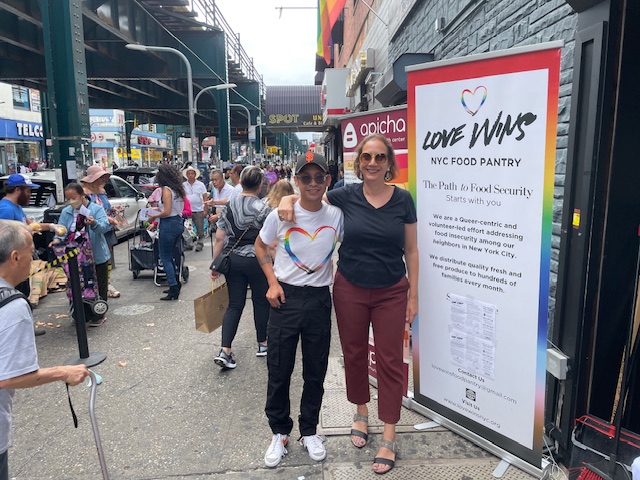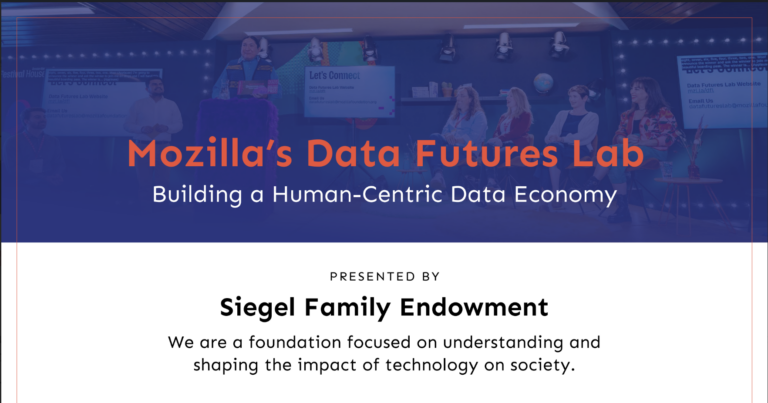Siegel’s 2023-2024 Education Media Cohort on AI reporting and how it’s shaping the future of the industry.
At Siegel, we assert that journalism is a cornerstone of healthy social infrastructure. Local news in particular plays a vital role alongside more traditional infrastructure in fostering a robust information ecosystem and sustaining our social fabric. Through its function of informing, engaging, and empowering citizens, local news serves as a linchpin of community cohesion, often providing the crucial “last mile” of information provisioning.
It’s no secret that AI and rapid technological change has upended the news media industry with a wide range of complex and interrelated challenges. However, nowhere are these challenges more acute than in education – an issue that plays out in every town in every state in the US, and at times finds itself as a proxy arena for larger culture wars. Without the coverage provided by local education media, the efforts of all stakeholders – from policymakers to districts and schools to civic institutions, including youth-serving nonprofits – face a steeper hill to success.
To that end, last year Siegel funded a cohort of education media organizations that serve different audiences and aspects of the news media industry. Made up of the five organizations Chalkbeat, Capital B, The Bell, Hechinger Report, and Education Week, through shared learning and collaboration the cohort has worked this past year to collectively make progress on:
- Supporting research and nuanced public understanding around key education issues;
- Bolstering the next generation of journalists equipped to navigate new and evolving realities;
- Bringing attention to the need of sustaining local news organizations, while also contributing to conversations about innovative models for the industry.
Earlier this spring, we sat down with representatives from each organization to discuss how AI and its associated impacts are – and could be – shaping the future of information ecosystems. What follows are the key questions and considerations that came out of our discussion.
What stories or voices are absent when we discuss the introduction of AI and tech in classrooms? What are we missing about teachers? Parents? School staff? School and district leadership?
Readers want tangible use cases, rather than more theory. Our cohort stressed the demand for reporting on specific and current use cases of AI, rather than speculation about what might happen. Readers feel inundated with “hot takes” when what they really want is guidance and expertise that can help them figure out what to do with AI.
Students aren’t particularly interested in reporting on AI. AI and technologies are not news or a standalone topic, but rather part of everyday life. To them, AI is not as interesting or distressing as other issues they care about, such as careers, mental health, climate, and inequality.
The demands of public school classrooms and curriculum aren’t set up for experimentation, but yet effective AI implementation and learning can’t take place without experimentation. The media, with its “on the ground” reporting and relationships with teachers, can play a larger role in elevating the successes and challenges when pilot programs have been able to take place.
People look to journalists to break things down. Both readers and journalists alike find the jargon around AI reporting frustrating and confusing. There continues to be a call from readers for “Back to Basics” series on AI terminology and the break-down of AI technology, which continue to do well across outlets.
There has been a lot of reporting on the risks of AI, but less on the lack of opportunity. While some schools are considering enterprise AI solutions and training, others do not have basic wifi. There is continued demand for reporting on technology, access, and equity in schools that’s not related to AI.
How do we bolster the next generation of journalists equipped to navigate new and evolving realities? Will current roles change? Will there be new roles entirely? What are the evolving skillsets and tools needed by future journalists?
Future journalists will need many of the same skills and mindsets as previous ones….
Our cohort has cited literacy, curiosity, skepticism, ambition, and research-driven as key traits. Journalists must read everything (“read beyond the search bar”) and know so much more than could ever fit in a story. They should also know what to cut, how to find and use experts, and how to follow leads. They should know the difference between advocacy and journalism, with the aim of fairness, balance and translation.
…but with a few adaptations in response to emergent and evolving technologies. Specifically, media literacy in a rapidly-evolving media landscape, such as the ability to distinguish platforms from people. For example, young people often cite “TikTok” as the source, rather than citing the creator who posted it. They should also be “obsessive and continuous learners” to make sense of issues and translate them for the public.
Students get conflicting messages about AI tools. On the one hand, they need to learn and use AI for their future careers, but on the other, they’re often prohibited from using them in the classroom. “If your students can cheat using ChatpGPT, they need different homework.”
“It’s hard to imagine how tech replaces field journalists.” The demand for on-the-ground information is not going anywhere.
How do we make the case for sustaining local news organizations, while also contributing to conversations about innovative models for the industry? What impacts are we seeing from large tech platforms, disruptive start-ups, or others on current business models? What are the new opportunities for revenue generation?
The tension between profit and sustainability is felt acutely in education and nonprofit newsrooms. Mission-oriented newsrooms exist in part to foster an informed citizenry, but making news more accessible eats the news media’s bottom line. AI has further decreased how the public values traditional reporting.
Paywalls impede the ability of both educators and education journalists to access quality research. Public schools do not often have the budget to purchase expensive subscriptions that give them access to up-to-date research and information on pedagogy and emerging tech. As such, they rely on journalists to surface, synthesize, and unpack such research. As research on AI lives increasingly behind paywalls, less quality information may find its way into schools and classrooms. What proprietary research do companies like Accenture or Deloitte share with deep-pocketed companies and individuals vs. what is open and publicly available? How can that research be made more available and affordable?
Philanthropic funding is often earmarked for only specific sectors or silos. Such narrow funding leaves little wiggle room to cover interdisciplinary and emerging topics, such as AI. And while we expect funding for AI to eventually increase, it may still be earmarked for AI as it relates to narrow sectors. Flexible dollars, general operating support, and/or dedicated funding for “experimentation” in journalism are needed.
####
About Siegel’s 2023-2023 Education Media Cohort
The Bell
The Bell equips New York City students with the tools to tell impactful stories today and the skills to thrive in the media careers of tomorrow. They specialize in teaching audio journalism and production to high school students who report on the NYC public school system through Miseducation, a podcast with local impact and national reach, as well as P.S. Weekly, a podcast collaboration with Chalkbeat’s seasoned education reporters.
Capital B
Capital B is a local-national nonprofit news organization that centers Black voices, audience needs and experiences, and partners with the communities we serve. Their national team produces in-depth journalism on topics of crucial importance to Black people across the country, such as, politics, health, criminal justice, the environment, and rural issues. Their local newsrooms (including Capital B Atlanta and Capital B Gary) publish need-to-know information informed by intensive community listening and engagement with Black residents.
Civic News Company
The parent organization of nonprofit newsrooms Chalkbeat and Votebeat, Civic News Company’s mission is helping people understand how America works so they can make it work better. They take a local-first approach to journalism, believing stories are best told locally: in communities, with communities, and for communities.
Education Week
Since 1981, Education Week has been America’s most trusted resource for K-12 education news and information. 1.6+ million readers. National coverage. From teachers to principals to district leaders across the country. Education Week’s diverse audience turns to us for the most up-to-date information on K-12 education in the U.S., as well as innovative, high-value tools and solutions.
Hechinger Report
The Hechinger Report focuses on issues of inequality and innovation in education, from the earliest years through college and careers. Their goal is to help the public understand the problems faced by our nation’s students and educators, along with the costs and benefits of proposed solutions. They believe that when the public, educators and elected officials better understand the causes and potential solutions to longstanding and pervasive inequality in our schools, they are more likely to take informed action and address these problems.
Work Shift (Non-Cohort Member; consulted on this summary)
Work Shift is a digital hub for news, analysis, and opinion focused on whether education and training are delivering the talent and opportunity that society needs.





